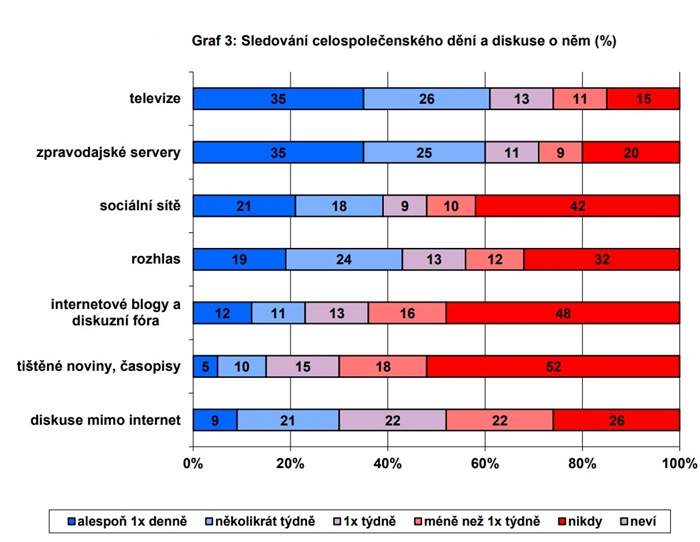People mostly follow social events via television and internet news sites. In both cases, more than a third (35%) of respondents said they follow society-wide events in this way at least once a day, and around a quarter (26% for TV, 25% for news sites) also reported the option 'several times a week'. That's according to new survey data from CVVM.
In the case of television there is a relatively lower proportion of those who say they never watch national events on it, which was reported by 15%, while the analogous proportion for internet news servers was 20%. Just over a fifth (21%) of respondents follow society-wide events on social networks on a daily basis, another less than a fifth (18%) do so several times a week and around a tenth either once a week (9%) or less frequently (10%).
The survey showed a similar, though not significantly lower, proportion of daily followers in the case of radio, where just under a fifth (19%) of respondents said they did so. Just under a quarter (24%) follow society-wide events via radio several times a week, with a further quarter following society-wide events via radio once a week (13%) or less frequently (12%).
 Source: the CVVM SOÚ AV ČR, Our Society, 12 September - 28 November 2024, 1008 respondents aged 15 and older, personal interview.
Source: the CVVM SOÚ AV ČR, Our Society, 12 September - 28 November 2024, 1008 respondents aged 15 and older, personal interview.Internet blogs and discussion forums are used to some extent by slightly more than half (52%) of respondents to follow society-wide events, including 12% daily, 11% several times a week, 13% once a week and 16% less frequently.
Five per cent use daily monitoring of society-wide events through printed newspapers and magazines, a tenth (10%) several times a week, 15% once a week and just under a fifth (18
less frequently.
Thirty-six per cent of respondents do not use any of the surveyed sources to follow society-wide events on a daily basis. A tenth (10%) of people do not follow society-wide events more than once a week in any of the ways surveyed. Overall, frequency of viewing is significantly correlated with general interest in politics. The importance of television increases with age, but to a lesser extent also that of print and radio, while the correlation with age is reversed for social networks, internet blogs and discussion forums and internet news sites.
Detailed information on the survey results can be found here.
Source: mediaguru.cz

